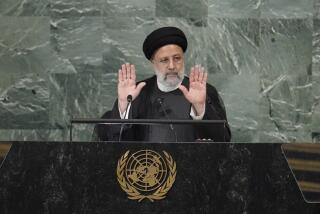Obama condemns Ahmadinejad’s allegations about 9/11
- Share via
Reporting from New York and Los Angeles — A day after he said the diplomatic door was open to Iran, President Obama on Friday sharply condemned President Mahmoud Ahmadinejad for his allegation that most Americans believe the United States fabricated the 9/11 terrorism attacks against New York and Washington.
Speaking before the United Nations General Assembly hours after Obama spoke, Ahmadinejad made his comments in a broad attack against the United States and its policies in the Mideast. U.S. officials walked out to protest the Iranian president’s speech.
“It was offensive. It was hateful,” Obama said on Friday in an interview with BBC Persian news service. The White House released an excerpt of the interview broadcast to the Iranian people in their main language, Farsi.
“And particularly for him to make the statement here in Manhattan, just a little north of ground zero, where families lost their loved ones, people of all faiths, all ethnicities who see this as the seminal tragedy of this generation, for him to make a statement like that was inexcusable,” Obama said.
On Sept. 11, 2001, Islamic terrorists stole four jetliners and sent them on suicide missions against the World Trade Center in New York City and the Pentagon in Washington. About 3,000 people died in the attacks, which toppled the trade center.
In the past, Ahmadinejad has taken provocative positions such as denouncing Israel and denying that the Holocaust killed 6 million Jews in Europe. He has been roundly condemned for such positions in the past by the United States and its allies. Ahmadinejad has addressed the annual opening of the General Assembly before and western diplomats have walked out to protest his anti-Israel comments.
In his Thursday speech, Ahmadinejad argued that only U.S. officials believed a terrorist group was responsible for the 2001 hijackings. He said others believe that some parts of the U.S. government were involved to hide the effects of a declining economy and to protect its ally, Israel.
“The majority of the American people as well as most nations and politicians around the world agree with this view,” Ahmadinejad claimed.
In his speech, Obama stressed that the diplomatic door was open to Iran for talks about its nuclear program but he repeated that the West would continue to sharply oppose Iran’s development of nuclear weapons including the use of sanctions which have not ended the dispute so far.
As he has before, Obama continued to separate the Iranian people from their government’s actions in pursuing a nuclear program. Obama has continually praised the people while seeking to halt the program by tightening sanctions, which often have a crippling effect on people.
“This is not a matter of us choosing to impose punishment on the Iranians,” Obama told the BBC. “This is a matter of the Iranians’ government I think ultimately betraying the interests of its own people by isolating it further.”
Asked why sanctions would work now, when Iran has been under sanctions for decades, Obama defended their use.
“We do think that the sanctions raise the costs for the government,” Obama said. Most of these sanctions are targeted at the regime, at its military. And we think that over time hopefully there’s enough reflection within the Iranian government that they say to themselves, you know, this is not the best course for our people; this is not the best course for Iran.”
Among the effect on regular people has been rising prices on food and medicine. “Are you not worried that this might backfire, that the people of Iran would be looking at America and wondering why they’re being punished in this process,” the interviewer asked.
“I am obviously concerned about the Iranian people, and they are trying to live their lives,” Obama said. “The question is, ‘Can the Iranian regime take a different approach that would help its people as opposed to harm its people?’”
As he has before, Obama minimized the threat of an invasion of Iran by the United States or Israel. He has also said that nothing is off the table.
“I don’t take war lightly. I was opposed to the war in Iraq. I am somebody who’s interested in resolving issues diplomatically,” Obama said.
Iran has a right to the peaceful use of nuclear power, Obama said and he called on Iran to take the steps to assure the world that it is not interested in nuclear weapons.
“if they take those constructive steps in serious negotiations, then not only should there not be a threat of war but there also won’t be the sanctions that are currently in place,” he said.
cparsons@tribune.com
Michael.muskal@latimes.comTwitter.com/LATimesmuskal
More to Read
Sign up for Essential California
The most important California stories and recommendations in your inbox every morning.
You may occasionally receive promotional content from the Los Angeles Times.















